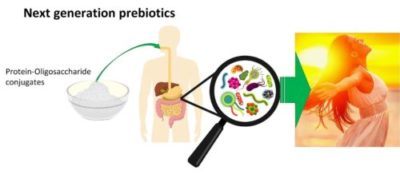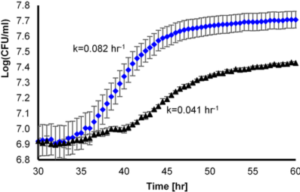Maintaining a good proportion of gut probiotic bacteria is imperative to health. This may be achieved by consuming “prebiotics” [e.g., galacto‐oligosaccharides (GOS)] – nutrients that selectively promote probiotic bacteria, as these bacteria often uniquely express transporters for such oligosaccharides. Proteins are an important source for amino acids essential to probiotic bacteria. Most protein digestion products are absorbed in the small intestine, and there is great competition on the residuals by colonic bacteria. Amino acids are scarce in the colonic intercellular fluid, thus limiting probiotics proliferation. However, no existing prebiotic product contains protein. We propose that the next generation of prebiotics will be protein‐containing prebiotics: A prebiotic product formed by covalent conjugation of an indigestible, prebiotic carbohydrate to a protein.
In our study we formed such conjugates, and found that most protein content of the conjugates endured simulated gastrointestinal digestion, hence is expected to reach the colon. Remarkably, we found that the growth rate of a model probiotic bacterium (Lactobacillus casei) on the conjugates was double that on the unconjugated components.

Research
Food
Targeted prebiotics

Relevant publications:
Next-Generation Prebiotics: Protein-Oligosaccharide Conjugates, Polymers for advanced technologies
Polymers for Advanced Technologies 2019;1–9

Delivery to the gut microbiota: A rapidly proliferating research field
Advances in Colloid and Interface Science 274, 102038 (2019)

